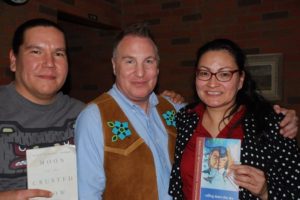Dbaajmawak: CBC hosts talk responsibility, making stuff up on night of Indigenous storytelling

By Laura E. Young
SUDBURY– By day, Rosanna Deerchild is a CBC Radio One journalist and host in Winnipeg. She is also afraid for her life when she steps onto the streets, and for her children’s lives.
“It doesn’t matter that I’m a radio host, poet and award-winner. When I’m out on the street, I’m just an Indian woman.”
That range of emotions and experience fuels the poet as Deerchild herself said as she introduced her latest work at the Dbaajmawak, evening of storytelling at Laurentian University on February 28.
Deerchild and Waubgeshig Rice, host of Up North on CBC Radio One in Northern Ontario, were the special guests at the sixth storytelling evening, along with host Gregory Scofield, an associate professor of English and renowned writer and published poet.
With the support of Laurentian’s English department, Scofield founded Dbaajmawak in 2015.
Before reading from her latest work-in-progress, Deerchild explained that her selection was part long-form poetry, part rant, meditation and all about surviving as an Aboriginal woman in Canada, she said.
The author of the acclaimed Calling Down the Sky (2015) hopes to finish the latest work this year and already has several publishers interested in it, she added.
“I think it’s an important piece of the dialogue that’s happening right now in Canada when we’re talking about reconciliation.”
She has no idea where her work will finish so she just follows and honours where it takes her, she said.
She writes wherever and whenever she can.
“I like to carry a notebook around with me because you never know when it’s going to happen. You never know when it’s going to visit. It could be in the middle of the night. It could be while I’m on the bus. I always like to be ready to catch and capture that thought, or that line, or that poem, or that meditation.”
The writing comes from a deeply emotional place where poetry is ceremony and is also a sense of discomfort, that she has to experience and walk through, she said.
“If I expect Canadians to listen to this poetry with an open mind and an open heart, and to understand, learn and make change, I at the very least have to walk through that pain and that difficulty so I can create beautiful and healing poetry out of it.”
Journalism and poetry do lend themselves to each other and are really different sides of the same coin, she added.
“They are intertwined many times in some ways. As a storyteller, I take that responsibility very seriously, particularly because as an Indigenous storyteller we have so much of those histories, experiences and stories that we carry.”
For Waub Rice, author of The Moon of the Crusted Snow, the land, his family and his Elders nourished his writing. He came to writing and his schooling as people were reconnecting with their Anishnaabe roots and traditions so it was a good time to be growing up, he said.
Rice eventually became a journalist, worked with Deerchild in Winnipeg and is now a radio host in Sudbury.
While there is truth to be told as a journalist, when it comes to writing fiction, “it’s a cool opportunity to make [stuff] up,” he told the full house at the Brenda Wallace Reading Room on February 28.
Laurentian’s Gregory Scofield emphasized that they were hosting a reading series at an amazing time with three distinct generations of Indigenous writers creating works in Canada: from the likes of Maria Campbell to Eden Robinson to people like Waub Rice and Alicia Elliott.
“It feels very, very powerful to be able to say that. It feels really quite amazing to be part of that Renaissance.”
Now he would especially like that their writing is read by their young people, indeed all people, in their communities, he said.
“As Waub and Rosanna were saying earlier, our work is starting to be read now by mainstream Canadians. Mainstream Canadians are waking up to their own history. And in waking up to their own history, they’re waking up to our reality as Indigenous people.”


